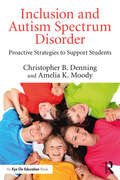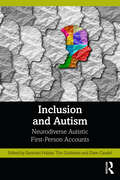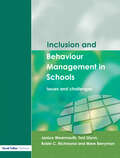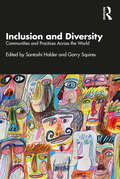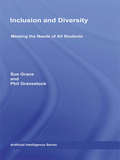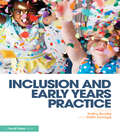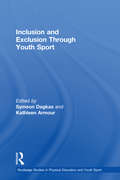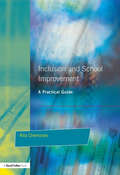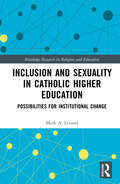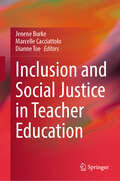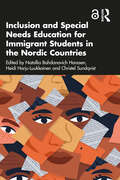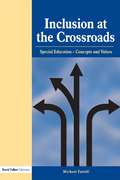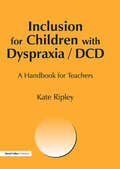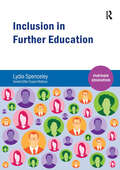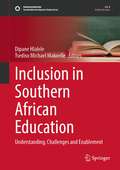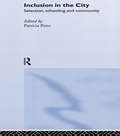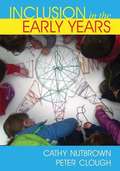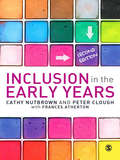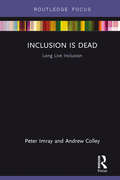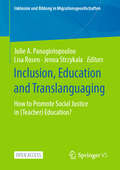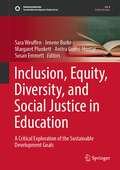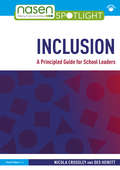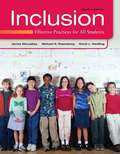- Table View
- List View
Inclusion and Autism Spectrum Disorder: Proactive Strategies to Support Students
by Christopher B. Denning Amelia K. MoodyInclusion and Autism Spectrum Disorder demonstrates specific user-friendly and evidence-based strategies that classroom teachers can implement to proactively set up and deliver classroom instruction that will maximize the chances of success for students with autism spectrum disorder (ASD). Teachers in inclusive environments are facing increasing pressure to meet the needs of diverse classrooms that include more students with ASD. This easy-to-use, research-based professional guide provides teachers with the activities and specific strategies they need, along with detailed descriptions that support immediate implementation.
Inclusion and Autism: Neurodiverse Autistic First-Person Accounts
by Santoshi Halder, Tim Goldstein and Dave CaudelThis book provides a fertile ground for having the collective voices of the autistic people to understand inclusion and the enigma of the autism spectrum from the neurodiverse lens. The book brings forth the first-person account of autistic adults and unravels various facts about autism spectrum disorder. It offers a fresh outlook on autistic adults, reflecting on inclusion, their challenges, and strengths presenting crucial elements for a successful inclusive model and the foundation of a robust and effective support delivery reinforcing the inclusion of autistic people in society. Through a range of neurodiverse voices, the book presents the world their unique perspectives. It offers valuable insights for future directions and strategic effective pathways stressing the need for a neuro-diverse lens and strength-based focus of support for manifestation and nurturance of abilities and strengths of people.Inclusive and incisive in its making, this book would be useful to the departments of Special Education, Psychology and Applied Psychology, Social Work, Sociology, and Public Health. It would also be an invaluable companion to special educators, in-service and prospective teachers, policy makers, parents, professionals from government and non-government departments, and researchers in the field of disability, diversity, and equity from around the world.
Inclusion and Behaviour Management in Schools: Issues and Challenges
by Janice Wearmouth Mere Berryman Ted Glynn Robin C. RichmondProvidng an overview of the issues crucial to understanding inclusion and behavior management in schools, this book discusses: * Policy at national, local authority and school level * Inclusive practices in mainstream settings * Issues such as race, ethnicity school disciplines and exclusion
Inclusion and Diversity: Communities and Practices Across the World
by Santoshi Halder Garry SquiresThis volume presents a comprehensive overview of inclusion and diversity in education across the globe. It examines how more inclusive education systems can be built and covers areas and topics such as disability studies, sexual minorities, and indigenous communities, marginalized communities among others. The book presents perspectives of experienced and cutting-edge researchers on inclusive practices that facilitates participation, equity, and access from across countries such as India, the USA, Australia, the UK, Canada, South Africa, Japan, Pakistan, Rome, Hungary, Sweden, and others. It discusses how spoken language, race, gender, and religion contribute to inclusion and marginalization. The volume also explores ideas on how schools and educational systems can respond to diversity-related issues, and the lessons learned about how to improve capacities for further inclusion. Additionally, it provides a holistic understanding of the classroom practices and interventions adopted to handle the problems of students with diverse needs. The book volume facilitates understanding of the broader spectrum of various diversities existing in our society and also the strategic pathways for their inclusion. This incisive and comprehensive volume will be of interest to students, teachers, and researchers of education, inclusion and diversity, equity and access, disability studies, educational psychology, social work, sociology, and anthropology. It will also be useful for teacher training course, and anyone who is associated with or working in the field of diversity and inclusion.
Inclusion and Diversity: Meeting the Needs of All Students (Key Guides for Effective Teaching in Higher Education)
by Sue Grace Phil GravestockHow should you prepare for the first day of class? How can you encourage all students to participate in discussions? How do you ensure disabled students can take part in field work? Increasingly, universities are drawing from a less traditional group of students – international students, disabled students, part time students, and mature students. This book offers specific, practical advice on the issues that teachers encounter when teaching in a diverse classroom. Inclusion and Diversity highlights good practice for all students, and provides a helpful structure around the day-to-day experiences of staff and students as they make contact with each other. With reference to the international literature, and discussing some of the educational principles that underpin an inclusive curriculum, this book covers a wide range of useful topics so that teachers will have quick access to guidelines on different aspects of teaching and learning: small and large group teaching e-learning work placements students’ lives out of the classroom personal tutoring skills agenda assessment employability and further study Addressing a range of themes, including student age, ethnicity, disability, sexuality and gender, this book aids all practitioners in higher education today – particularly those new lecturers meeting their students for the first time – to develop a better understanding of the issues involved in teaching a diverse range of students.
Inclusion and Early Years Practice
by Kathy Brodie Keith SavageInclusion is a difficult, complex issue for which there are no off-the-shelf answers. To be an effective practitioner it is necessary to identify what makes each situation and circumstance unique and use this knowledge to develop strategies and approaches that are appropriate. This timely new text examines the key perceptions, perspectives and concepts around inclusion in the Early Years. Drawing on real-life experiences of practitioners, it considers the questions practitioners are likely to come across in their professional lives and how they might genuinely go about meeting the needs of all the children in their care. The book covers all aspects of inclusion including special educational needs, gender and sexuality, multiculturalism, multilingualism, Roma and traveller communities and economic wellbeing. Each chapter features: Case studies to develop reflective thinking Boxed examples to illustrate key points Questions to promote discussion and debate Annotated further reading lists With case studies drawn from current research and thinking points which encourage reflective practice, this book will be essential reading for students on early childhood studies programmes and early years foundation degrees that wish to become reflective and critically aware practitioners.
Inclusion and Exclusion Through Youth Sport (Routledge Studies in Physical Education and Youth Sport)
by Symeon Dagkas and Kathleen Armour'We can reach far more people through sport than we can through political or educational programmes. In that way, sport is more powerful than politics. We have only just started to use its potential to build up this country. We must continue to do so.' – Nelson Mandela Nelson Mandela's statement reflects a widely held view that sport can contribute in unique and far-reaching ways to the delivery of important social outcomes. But is this really the case? Can sport bring people from different backgrounds together, and in so doing act as a force for social transformation and change? In the language of policymakers and practitioners, can sport contribute to social inclusion or could it be argued that sport acts to marginalize and disadvantage some groups in society? In other words could sport reinforce, rather than challenge, social inequality? Focusing on youth sport as a touchstone sector of sport in society, this book examines the theoretical and empirical bases of arguments for the role of sport in social inclusion agendas. Authors are drawn from around the world and offer critical perspectives on assumptions underpinning the bold claims made about the power of sport. This book represents the most up-to-date and authoritative source of knowledge on inclusion and exclusion in youth sport. As such, it is essential reading for those who want to use sport to 'make a difference' in young people's lives. It is, therefore, recommended for students, researchers, policy makers and practitioners working in sports development, sports coaching, sport studies or physical education.
Inclusion and School Improvement: A Practical Guide
by Rita CheminaisThis practical comprehensive book for senior managers and inclusion coordinators covers all the essential aspects of how to manage inclusion more effectively. It informs coordinators about effectively managing their own continuing professional development, and that of other staff working within the inclusion team. The book explores the role of inclusion assistants, managing an inclusive resource center, identifying barriers to learning for a diversity of pupils; and applying the Index for Inclusion, the Business Excellence Model and the Ofsted school self-evaluation model to review and support inclusive school practice. It also looks at the role of external professionals, support services, beacon, special and specialist schools, national initiatives and ICT enabling schools to improve their inclusive provision.
Inclusion and Sexuality in Catholic Higher Education: Possibilities for Institutional Change (Routledge Research in Religion and Education)
by Mark A. LevandDrawing on research conducted at 17 Catholic universities in the United States, making it the largest study of its kind, this volume explores effective practice in improving institutional policy relating to issues of sexuality. The text calls attention to campus cultures of fear, shame, or denial around sexuality and highlights possible points of institutional resistance to changes in policy. Discussing topics such as sexual identity, sexuality education in the curriculum, Title IX, employee termination, and morality clauses, the book shows how staff and faculty are crucial in effecting change across Catholic campuses, providing valuable insight into the “unspoken rules” around sexuality within the shadow culture at Catholic institutions. Moreover, the text illustrates how institutions can maintain fidelity to Church teachings and even embrace notions of human dignity, solidarity, and the common good to achieve sexual inclusivity. A unique study demonstrating how Catholic teaching can help support inclusive change around issues of sexuality and gender in higher education, it ultimately puts forward a practical framework for effecting change and improving student and staff support structures in Catholic institutions. It will thus appeal to researchers and academics working in the fields of Higher Education Management, Gender and Sexuality in Education, Religion, Gender and Sexuality, and the Sociology of Religion.
Inclusion and Sexuality in Catholic Higher Education: Possibilities for Institutional Change (Routledge Research in Religion and Education)
by Mark A. LevandDrawing on research conducted at 17 Catholic universities in the United States, making it the largest study of its kind, this volume explores effective practice in improving institutional policy relating to issues of sexuality.The text calls attention to campus cultures of fear, shame, or denial around sexuality and highlights possible points of institutional resistance to changes in policy. Discussing topics such as sexual identity, sexuality education in the curriculum, Title IX, employee termination, and morality clauses, the book shows how staff and faculty are crucial in effecting change across Catholic campuses, providing valuable insight into the “unspoken rules” around sexuality within the shadow culture at Catholic institutions. Moreover, the text illustrates how institutions can maintain fidelity to Church teachings and even embrace notions of human dignity, solidarity, and the common good to achieve sexual inclusivity.A unique study demonstrating how Catholic teaching can help support inclusive change around issues of sexuality and gender in higher education, it ultimately puts forward a practical framework for effecting change and improving student and staff support structures in Catholic institutions. It will thus appeal to researchers and academics working in the fields of Higher Education Management, Gender and Sexuality in Education, Religion, Gender and Sexuality, and the Sociology of Religion.
Inclusion and Social Justice in Teacher Education
by Marcelle Cacciattolo Jenene Burke Dianne ToeThe scholarly chapters in this edited collection come from authors undertaking social justice research within the teacher education discipline. Authors examine, explore and critique those educational practices and structures that disadvantage minority groups. With a focus on social justice and inclusion, the book concentrates on themes of equity, diversity, learning spaces and effective learning for all, examining the implications for teacher education. An array of critical traditions and methodologies that interrogate educational issues from political, cultural, structural, and social perspectives are explored. This book provides insights on building the capacities of teacher education stakeholders in teaching and learning contexts to understand and respond with equity and justice. Teacher educators, preservice teachers, practicing teachers, and other education stakeholders may find this book to be an excellent resource for developing a critical lens relating to social justice and inclusion in education.
Inclusion and Special Needs Education for Immigrant Students in the Nordic Countries
by Heidi Harju-Luukkainen Natallia Bahdanovich Hanssen Christel SundqvistInclusion for immigrant students with special educational needs (SEN) is a neglected area of research. This edited volume addresses this problem, providing up-to-date insights into the provided support and special needs education (SNE) for immigrant students in different contexts of the Nordic countries. This important book explores the diversity of student experiences, addressing both compulsory schools and vocational education, and examines how different Nordic countries conceptualise and approach support and SNE for immigrant students. Readers will get an opportunity to read various studies that address gaps in the realisation of inclusion and special need education. This book initiates a dialogue on generating new knowledge, approaches, and methods to expand the flexibility necessary to implement a fully inclusive education. The book offers research that includes strong theoretical and practical frameworks, interviews, interventions, assessments, case studies as well as offers future directions for inclusive and special needs education. By exploring the process of inclusion and special needs education in the Nordic countries, this book is an essential read for those who intend to deepen their understanding and to enact inclusion, and the development of special needs education for immigrant students.
Inclusion and Special Needs Education for Immigrant Students in the Nordic Countries
by Heidi Harju-Luukkainen Natallia Bahdanovich Hanssen Christel SundqvistInclusion for immigrant students with special educational needs (SEN) is a neglected area of research. This edited volume addresses this problem, providing up-to-date insights into the provided support and special needs education (SNE) for immigrant students in different contexts of the Nordic countries.This important book explores the diversity of student experiences, addressing both compulsory schools and vocational education, and examines how different Nordic countries conceptualise and approach support and SNE for immigrant students. Readers will get an opportunity to read various studies that address gaps in the realisation of inclusion and special need education. This book initiates a dialogue on generating new knowledge, approaches, and methods to expand the flexibility necessary to implement a fully inclusive education. The book offers research that includes strong theoretical and practical frameworks, interviews, interventions, assessments, case studies as well as offers future directions for inclusive and special needs education.By exploring the process of inclusion and special needs education in the Nordic countries, this book is an essential read for those who intend to deepen their understanding and to enact inclusion, and the development of special needs education for immigrant students.
Inclusion at the Crossroads: Special Education--Concepts and Values
by Michael FarrellAnswering challenging questions such as "Does the term SEN mean anything any more?" and "Is SEN biologically or socially determined?" this book: * Makes sense of the controversy surrounding Special Educational Needs with clear sign posted information * Is comprehensive in the range of Special Educational Needs it covers * Clarifies information with case studies
Inclusion for Children with Dyspraxia: A Handbook for Teachers
by kate RipleyThis book is about children with dyspraxia: developmental co-ordination disorders (DCD) and what teachers and other professionals can do to promote their learning and their social inclusion in a mainstream setting. The author addresses issues which affect access to the curriculum in Key Stages 1-4 and offers strategies to support children which have proved effective to experienced practitioners and can be managed in a group or class context. A key component of the book is an understanding of the emotional and social needs of children with dyspraxia.
Inclusion in Further Education (Further Education)
by Lydia SpenceleyFor all those teaching or training to teach within the Further Education (FE) sector, this book provides a critical understanding of the complex concept of inclusion and its implementation in a range of different contextual settings. It encourages the reader to revisit their own beliefs and assumptions concerning inclusion in relation to their own practice, and a range of learning features including clear objectives, case studies, critical thinking tasks and chapter reflections ensures deep understanding.The increasing importance of inclusion, and the growing provision of Higher Education courses in FE, means that an accessible book which facilitates a critical understanding of inclusion policy and develops relevant academic competence is both timely and essential.
Inclusion in Southern African Education: Understanding, Challenges and Enablement (Sustainable Development Goals Series)
by Tsediso Michael Makoelle Dipane HlaleleThis book reflects on more than two decades of adoption practices of inclusive education policy in Southern Africa. It is aimed at taking stock of the successes, challenges and achievements during this journey of making education inclusive and equitable. It responds to the educational needs of learners at all levels, regardless of their diverse needs, such as disability, gender, socio-economic status, race, ethnicity and language background.This book furthers the understanding and conceptualization of the notion of inclusion in education, and explores the challenges experienced during the operationalization and implementation of the process. It extends debates spawned by international and national policy mandates that sought to transcend exclusionary educational practices in order to realize inclusive societies and, by implication, inclusive classrooms. It offers a comprehensive conceptual framework for inclusive education in the Southern African context while drawing parallels from the regional and international experience. This book can be used as a reference or critical reading for scholars and researchers in the field of inclusive education. It will empower practitioners, administrators, teachers and school leaders, curriculum developers and planners, as well as policy makers with knowledge about theory and practice regarding inclusive education in the Southern African schooling system.
Inclusion in the City: Selection, Schooling and Community
by Patricia PottsInclusion in the City explores inclusion and exclusion in the context of policy and practice in one English city - Birmingham. Here, a commitment to redressing the inequalities experienced by many learners has been inhibited by difficulty in securing agreement to a definite policy for inclusion and, consequently, in sustaining initiatives for strengthening participation in community comprehensive education.Grounded in an understanding of inclusion as a political and moral project, the book presents a range of perspectives from policymakers and practitioners. Detailed case studies, based on research specially undertaken for this book, relate inclusion to key issues in contemporary education such as; the effects of selection by attainment; faith schools and their communities; single sex education and inclusive schools; participation in further education; and social mobility.Insightful, thought provoking and original, Inclusion in the City detaches processes of inclusion and exclusion from the language of educational reform. In so doing it highlights links between participation in education and poverty, gender and cultural background, as well as the absence of a link between urban and educational renewal.
Inclusion in the Early Years
by Cathy Nutbrown Peter CloughIn this insightful text, the authors argue for a broad definition of inclusion, not limited to those with learning difficulties or impairment. The book presents a number of original stories generated from a recent research project carried out by the authors, and shows how to apply theory to practice. This new and revised edition includes an increased focus on: -Inclusion as a political issue -Social class -Poverty -Children's rights -The inclusion of gay and lesbian parents and staff -Practical activities including workshops and role-plays -Different policies around the UK This text is essential for all Early Years students, practitioners and researchers who want to become familiar with current research into inclusion and to develop ways of drawing on such studies to inform and develop their own inclusive practices. Cathy Nutbrown is Professor of Education and Director for Research at the University of Sheffield. Peter Clough is Honorary Professor of Education at the University of Sheffield Frances Atherton is Head of Department of Early Childhood Studies, at the University of Chester.
Inclusion in the Early Years: Critical Analyses And Enabling Narratives
by Cathy Nutbrown Peter Clough Frances AthertonThis insightful text shows how the attitudes of adults in early years settings can influence practice. The authors argue for a broad definition of inclusion, not limited to those with learning difficulties or impairment, but addressing factors affecting all members of the learning community. The book shows how the lives of practitioners, parents and children have been affected by inclusive and exclusionary practices. This new and revised edition includes an increased focus on: - inclusion as a political issue - social class - poverty - children's rights - gay and lesbian parents and staff This text is essential for all early years students, practitioners and researchers who want to become familiar with current research into inclusion and to develop ways of drawing on such studies to inform and devleop their own inclusive practices. Cathy Nutbrown is Professor of Education and Director for Research at the University of Sheffield. Peter Clough is Honorary Professor of Education at the University of Sheffield Frances Atherton is Head of Department of Early Childhood Studies, at the University of Chester.
Inclusion is Dead: Long Live Inclusion
by Peter Imray Andrew ColleyInclusion is Dead is a provocative polemic against the widely held notion that inclusion for all children and young people with SEN is both possible and desirable. For those with severe learning difficulties (SLD) and profound and multiple learning difficulties (PMLD), the authors argue, it is neither. Imray and Colley assert that the dominance of inclusion has meant that there has been no serious attempt to look at the educational difficulties faced by learners with PMLD and SLD. As a vision of egalitarianism and equality for all, they say, inclusion is dead. The authors controversially believe that unless education changes, it will remain as a disabling institution that does the exact opposite of its intention. The book presents the argument that theorists of inclusion have failed to provide practical solutions on how inclusion can be achieved when SLD and PMLD learners are involved, as well as discussing the drawbacks of the ‘inclusion for all argument’. With up-to-date references throughout, Inclusion is Dead will be an insightful read for teachers and SENCO trainers, as well as postgraduates and undergraduates studying courses on politics, philosophy and society.
Inclusion, Education and Translanguaging: How to Promote Social Justice in (Teacher) Education? (Inklusion und Bildung in Migrationsgesellschaften)
by Lisa Rosen Julie A. Panagiotopoulou Jenna StrzykalaThis open access book is designed as an international anthology on the broader subject of inclusion, education, social justice and translanguaging. Prefaced by Ofelia García, the volume unites conceptional and empirical contributions focusing on various actors within educational institutions, from early childhood to secondary education and teacher training, while offering insights into multiple European and North-American educational systems.
Inclusion, Equity, Diversity, and Social Justice in Education: A Critical Exploration of the Sustainable Development Goals (Sustainable Development Goals Series)
by Margaret Plunkett Jenene Burke Sara Weuffen Anitra Goriss-Hunter Susan EmmettThis book presents an edited collection of critical discourse situated in the fields of diversity and inclusion broadly, and more specifically, within the discipline of education. Each chapter articulates the importance of educational diversity in achieving the United Nations Sustainable Development Goal 4. The edited collection presents a grounding narrative of equitable learning opportunities and experiences via interpretivist theoretical frameworks and student-centered methodologies. The combination of these approaches, combined within the strong and scholarly-informed social justice lens, reminds us, that the onus of education is to acknowledge, recognise, respect, and engage with the diverse student cohorts, learning needs, and multiple knowledges and cultures that exist in educational contexts. This edited collection creates a holistic discourse around the experiences, interrogations, and innovations occurring within education communities to foreground deeper and more holistic understanding of the intersectionality of diversity and inclusion existing within the contemporary educational settings.
Inclusion: A Principled Guide for School Leaders (nasen spotlight)
by Des Hewitt Nicola CrossleyThis valuable and accessible guide navigates school leaders and those in training through a number of key areas of inclusion, providing context and understanding, helpful definitions, examples of leadership in action, and ten essential principles of inclusive leadership. Inclusion: A Principled Guide for School Leaders discusses what a culture of inclusion should look like: in classes, in schools, and in the education sector more widely. Each chapter acts as a think piece to stimulate debate, to reflect upon the purpose of education, and to ask how far we have come in embracing inclusion. The book also offers suggested actions for principled leaders and illustrative case studies to bring the theory to life, taken from a range of schools and spanning a wide number of topics, including: Inclusive Learning Partnerships with Learners and Families Special Educational Needs Disadvantage and Socio-Economic Poverty Culture, Language and Ethnicity This book explores a variety of issues in inclusion, highlighting the implications for school leaders and offering an approach to develop learning for marginal groups through effective strategic leadership. It will be essential reading for SENCOs, middle and senior leaders, but equally of interest to those who aspire to be inclusive leaders of the future.
Inclusion: Effective Practices For All Students
by Michael S. Rosenberg James McLeskey David L. WestlingBalancing foundational information with a real world approach to inclusion, Inclusion: Effective Practices for All Students, 2e equips teachers to create effective inclusive classrooms. The most applied text in the market, this second edition sharpens its focus and its organization to more clearly outline best practices for inclusive classrooms. The book's three part structure opens with the foundational materials you'll need to truly understand inclusive classrooms, followed by brief categorical chapters to give you the information you need to meet the needs of all students. Finally, field tested and research based classroom strategies are laid out on perforated pages to make the transition from theory to practice seamless.
